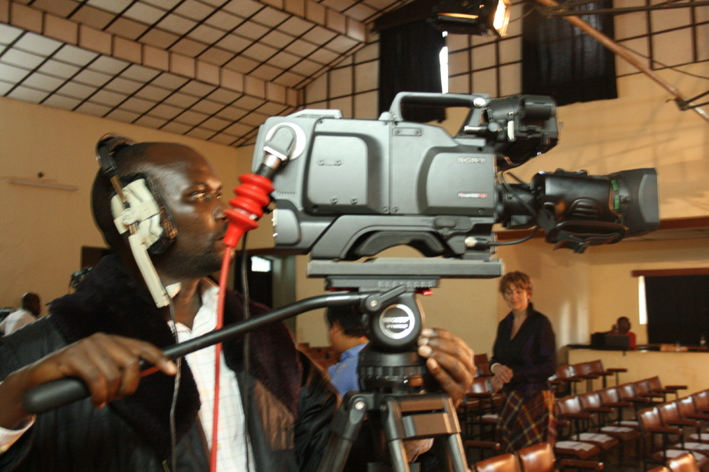Breaking the Silence the Rwandan version or: ‘you’re not
alone’ has got its blessings! Some
600 people visited the two first performances and have approved its right to
be. The representative of director Carole Karemera, who couldn't be there during opening night, told us Ishyo Arts Centre had never seen such crowds in its 240 seats theatre. A
few hours before the opening at 6pm, (due to the commemoration period
our performances start early, so people are home early) we got a call that
Rwandan television prepared to live broadcast our opening night. After they had
cancelled their plans to broadcast the performance due to other obligations in
this week of commemoration, we decided to let go all possible protests and only
made sure they would plug the sound directly in our system.
So George has been witnessing the opening night walking to and from the
OB van, while I was sitting next to La Benevolencija´s intern Elie who was
handling the surtitles without really knowing the show. We have adapted
the strong improvisational mood that is around us.
The theatre was packed with a Rwandan audience, including one of
Benevolencija’s grassroot groups. Both somewhat similar to our performances in
Cambodia, with children sitting in the front
and some murmuring in the back from people who explained what was happening
on stage to those who could not see. Meanwhile one could feel the focussed attention
of everybody. Each silence on stage was answered by a total silence in the audience. And afterwards everyone stayed for the
question and answer. Here we could feel the real difference. A difference one
could easily mistake as a cultural difference. We have by now learned to
understand this as a difference caused by the opposite governmental policy
after genocide. While Cambodian government, till now, is frustrating the open
debate on genocide and its juridical aftermath, Kagame has been provoking every
citizen to speak up during the gacaca’s. He has found it necessary to dictate
strict rules to the debate – like to forbid to speak about Tutsi’s and Hutu’s
and to make jokes about the genocide – but ‘breaking the silence’ is not our
main objective in Rwanda. The audience did speak up and proved to be very interested in the history
of the Cambodians – and how it does and does not mirror their own experiences.
On the day of our second performance Frans Makken, the Dutch Ambassador
in Kigali, offered the whole cast and crew a lunch at his residency. With his
warm welcome and bright vision he managed to make anyone feel special and
triggered the most extensive exchange of ideas about the policies and realities
in both countries we’ve had up till then. Everybody participated: Rwandans,
Cambodians, Dutch. The same evening he visited the performance, together with a
vast part of his staff. Also the Rwandan Minister of Health was part of the
audience.







Congratulations on a Great Initiative!
BeantwoordenVerwijderen